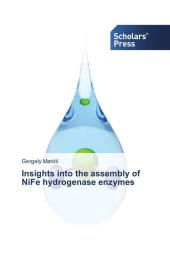 Neuerscheinungen 2014Stand: 2020-02-01 |
Schnellsuche
ISBN/Stichwort/Autor
|
Herderstraße 10
10625 Berlin
Tel.: 030 315 714 16
Fax 030 315 714 14
info@buchspektrum.de |

Gergely Maróti
Insights into the assembly of NiFe hydrogenase enzymes
2014. 96 S. 220 mm
Verlag/Jahr: SCHOLAR´S PRESS 2014
ISBN: 3-639-66975-4 (3639669754)
Neue ISBN: 978-3-639-66975-6 (9783639669756)
Preis und Lieferzeit: Bitte klicken
Certain photosynthetic organisms have the capability to produce molecular hydrogen by converting solar energy into this clean energy source. Hydrogen can be burnt, high amount of clean energy can be generated, and the only byproduct is water. Certain organisms contain ancient enzymes, which can evolve hydrogen from protons and electrons. These enzymes are the hydrogenases, which catalyze the oxidation of molecular hydrogen into protons and electrons, and the reverse reaction, the reduction of protons to yield molecular H2. Considering the complexity in function and localization, in addition to the structural sophistication of [NiFe] hydrogenases and their active sites, it is not surprising that many genes are required for the biosynthesis of these enzymes. The subunits coded by the structural genes have to undergo modification processes mediated by the so-called accessory proteins. This molecular assembly requires at least 10 auxiliary proteins. Some of them are needed for the maturation of all hydrogenase enzymes in the cell, these are the hydrogenase pleiotropic (Hyp) accessory proteins, while others are specific for only one hydrogenase in the host organism.
Gergely Maróti is an Associate Professor at the Biochemistry Institute of the Biological Research Centre, Hungarian Academy of Sciences in Szeged, Hungary.


